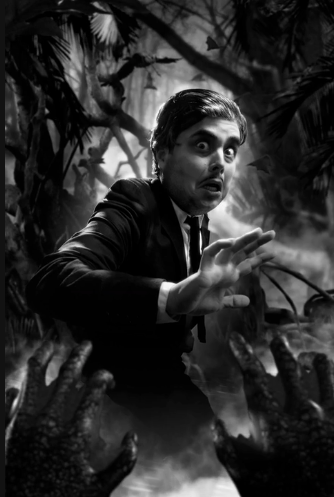I read an article by Heather Murphy in the New York Times recently about a lost manuscript of John Steinbeck’s. I’m never surprised to find out that famous authors have written other works, but this one piqued my interest because I think of Steinbeck as a very literary writer who explores deep themes in his work. Yet this newly discovered manuscript was a “lighthearted detective novel featuring a werewolf.”
Professor Gavin Jones unearthed it when he was researching a book he was writing about the author.
Steinbeck wrote “Murder at Full Moon” in nine days in 1930, and it includes illustrations by Steinbeck himself.

Jones was surprised by how good it was. The sleuths are a cub reporter and an eccentric sheriff who investigate the killing of a dog which kicks off a bunch more murders of people, all under a full moon, “near a spooky dismal marsh.” They begin to think the killer is some sort of swamp monster. “The investigators apply a theory of crime detection built on reading bad murder mysteries.” Jones said it gives the novel a postmodern, ironic feel.
I would LOVE to read that!
Unfortunately, the agency that handles Steinbeck’s work won’t publish it because even though he held on to the manuscript until he died in 1968, he never chose to release it himself, and they want to honor that.
But … he held on to the manuscript until he died in 1968. He could have destroyed it at any time, yet he didn’t. That makes me think he believed there was something noteworthy about it.
Jones and a few other scholars think it should be published because it has merit. He says, “It’s a lost piece of California noir. I think he was inventing something here.”
So, I’m torn.
I completely understand an author who achieves fame for classics like “The Grapes of Wrath,” “Cannery Row,” and “Of Mice and Men” might not want to dilute his brand during the height of his career by publishing what sounds like a delightfully goofy—but apparently well-written—genre mystery.
But on the other hand, he’s been dead for a long time. His place in the literary world is sealed. One lighthearted romp into the mystery genre would never dislodge him from that pedestal.
Steinbeck himself said he was a mere ten rejections away from quitting the business altogether around the time he wrote this. I’m glad he stuck it out, but I’d sure love to read about the fictional swamp monster of Steinbeck’s imagination.
What do you think? Should famous authors’ wishes about their unpublished manuscripts be vigilantly adhered to long after their deaths? Or is there inherent literary value in their unpublished works?
2 thoughts on “Steinbeck’s Fictional Swamp Monster”
I’d love to read it! I agree that it couldn’t damage his literary reputation at this point. It might even enhance it, since it shows versatility. But then, I still regret that Gerard Manley Hopkins destroyed most (all? memory is vague) of the poems he wrote before he became a priest.
If the author does it, I don’t worry too much … there must have been a reason, right? But I keep getting stuck at the fact that Steinbeck DIDN’T destroy his, making it seem that he still liked it. Sigh.